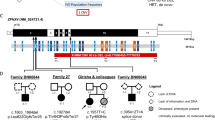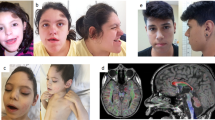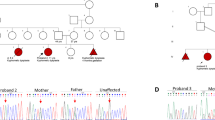Abstract
Oculo-auriculo-vertebral spectrum (OAVS) is characterized by abnormal development of the 1st and 2nd branchial arches. Despite arguments against a monogenic condition, a few genes have been involved in a minority of cases. We now report heterozygous, presumably loss-of function variants in the CHAF1A gene in 8 individuals, including 3 members of the same family. Four cases fulfill stringent diagnostic criteria for OAVS, including asymmetric ear dysplasia, preauricular tags, mandibular asymmetry +/− vertebral malformations. Two patients also presented with kidney malformations. CHAF1A encodes a subunit of CAF-1 (chromatin assembly factor-1), a heterotrimeric protein complex responsible for the deposition of newly synthesized histones H3-H4 onto the newly synthetized DNA strand during replication. The identification of loss-of-unction variants in CHAF1A is consistent with the hypothesis of early developmental genes dysregulation driving OAVS and other associations recently lumped under the acronym Recurrent Constellations of Embryonic Malformations (RCEM).

This is a preview of subscription content, access via your institution
Access options
Subscribe to this journal
Receive 12 print issues and online access
269,00 € per year
only 22,42 € per issue
Buy this article
- Purchase on SpringerLink
- Instant access to full article PDF
Prices may be subject to local taxes which are calculated during checkout


Similar content being viewed by others
Data availability
The variants have been submitted to ClinVar, accession number SCV005061834 to 1839. Other data generated or analyzed during this study are included in the published article. Details are available from the corresponding author upon reasonable request.
References
Beleza-Meireles A, Clayton-Smith J, Saraiva JM, Tassabehji M. Oculo-auriculo-vertebral spectrum: a review of the literature and genetic update. J Med Genet. 2014;51:635–45.
Tingaud-Sequeira A, Trimouille A, Sagardoy T, Lacombe D, Rooryck C. Oculo-auriculo-vertebral spectrum: new genes and literature review on a complex disease. J Med Genet. 2022;59:417–27.
Mastroiacovo P, Corchia C, Botto LD, Lanni R, Zampino G, Fusco D. Epidemiology and genetics of microtia-anotia: a registry based study on over one million births. J Med Genet. 1995;32:453–7.
Barisic I, Odak L, Loane M, Garne E, Wellesley D, Calzolari E, et al. Prevalence, prenatal diagnosis and clinical features of oculo-auriculo-vertebral spectrum: a registry-based study in Europe. Eur J Hum Genet EJHG. 2014;22:1026–33.
Thomas MA, Bedard T, Crawford S, Grevers X, Lowry RB. Craniofacial microsomia, associated congenital anomalies, and risk factors in 63 cases from the Alberta congenital anomalies surveillance system. J Pediatr. 2023;261:113528.
Adam AP, Curry CJ, Hall JG, Keppler-Noreuil KM, Adam MP, Dobyns WB. Recurrent constellations of embryonic malformations re-conceptualized as an overlapping group of disorders with shared pathogenesis. Am J Med Genet A. 2020;182:2646–61.
Ranza E, Le Gouez M, Guimier A, Dunlop NK, Beaudoin S, Malan V, et al. Retrospective evaluation of clinical and molecular data of 148 cases of esophageal atresia. Am J Med Genet A janv. 2023;191:77–83.
Celse T, Tingaud-Sequeira A, Dieterich K, Siegfried G, Lecaignec C, Bouneau L, et al. OTX2 duplications: a recurrent cause of oculo-auriculo-vertebral spectrum. J Med Genet. 2023;60:620–6.
Timberlake AT, Griffin C, Heike CL, Hing AV, Cunningham ML, Chitayat D, et al. Haploinsufficiency of SF3B2 causes craniofacial microsomia. Nat Commun. 2021;12:4680.
Mao K, Borel C, Ansar M, Jolly A, Makrythanasis P, Froehlich C, et al. FOXI3 pathogenic variants cause one form of craniofacial microsomia. Nat Commun. 2023;14:2026.
Quiat D, Timberlake AT, Curran JJ, Cunningham ML, McDonough B, Artunduaga MA, et al. Damaging variants in FOXI3 cause microtia and craniofacial microsomia. Genet Med J Am Coll Med Genet 2023;25:143–50.
Hennekam RC, Krantz ID, Allanson JE, Gorlin RJ Syndromes of the head and neck. 5. ed. Oxford: Oxford Univ. Press; 2010. 1452 p. (Oxford monographs on medical genetics).
Risheg H, Pasion R, Sacharow S, Proud V, Immken L, Schwartz S, et al. Clinical comparison of overlapping deletions of 19p13.3. Am J Med Genet A 2013;161A:1110–6.
Volk A, Crispino JD. The role of the chromatin assembly complex (CAF-1) and its p60 subunit (CHAF1b) in homeostasis and disease. Biochim Biophys Acta 2015;1849:979–86.
Liu CP, Yu Z, Xiong J, Hu J, Song A, Ding D, et al. Structural insights into histone binding and nucleosome assembly by chromatin assembly factor-1. Science. 2023;381:eadd8673.
Nakano S, Stillman B, Horvitz HR. Replication-coupled chromatin assembly generates a neuronal bilateral asymmetry in C. elegans. Cell. 2011;147:1525–36.
Gopinathan NA, Rabas N, Lejon S, Homiski C, Osborne MJ, Cyr N, et al. Unorthodox PCNa binding by chromatin assembly factor 1. Int J Mol Sci. 2022;23:11099.
Houlard M, Berlivet S, Probst AV, Quivy JP, Héry P, Almouzni G, et al. CAF-1 is essential for heterochromatin organization in pluripotent embryonic cells. PLoS Genet. 2006;2:e181.
Kaufman PD, Kobayashi R, Stillman B. Ultraviolet radiation sensitivity and reduction of telomeric silencing in Saccharomyces cerevisiae cells lacking chromatin assembly factor-I. Genes Dev. 1997;11:345–57.
Acknowledgements
We sincerely thank the families for their participation. This research benefited access to the data generated by the “Plan France Médecine Génomique”, the DECIPHER community and the DDD project in the UK funded through partnership between Wellcome and the Department of Health, and the Wellcome Sanger Institute.
Funding
This work was supported by the Philanthropy Department of the Mutuelles AXA through the Imagine-Head and Heart Chair.
Author information
Authors and Affiliations
Contributions
VP, JDE, NMG, ALA, BC, IMML, EARN, RS, PJ, TD, HZE, AS, SH, AP, PB, JA conducted molecular and clinical evaluation of the patients. FO revised the manuscript according to CAF-1 function. VP set up the study and collected the data. JA and VP wrote the manuscript that was reviewed and edited by all authors.
Corresponding author
Ethics declarations
Competing interests
There is no competing interest. HZE is an employee of GeneDx, LLC, USA.
Ethical approval
These studies have been approved by institutional committees in each country when performed on a research basis. Ethical approvement was not required for case reports based on analysis performed in diagnostic conditions. Consent for publication of photos was obtained.
Additional information
Publisher’s note Springer Nature remains neutral with regard to jurisdictional claims in published maps and institutional affiliations.
Rights and permissions
Springer Nature or its licensor (e.g. a society or other partner) holds exclusive rights to this article under a publishing agreement with the author(s) or other rightsholder(s); author self-archiving of the accepted manuscript version of this article is solely governed by the terms of such publishing agreement and applicable law.
About this article
Cite this article
Pingault, V., Neiva-Vaz, C., de Oliveira, J. et al. Chromatin assembly factor subunit CHAF1A as a monogenic cause for oculo-auriculo-vertebral spectrum. Eur J Hum Genet 33, 131–136 (2025). https://doi.org/10.1038/s41431-024-01698-5
Received:
Revised:
Accepted:
Published:
Issue Date:
DOI: https://doi.org/10.1038/s41431-024-01698-5



